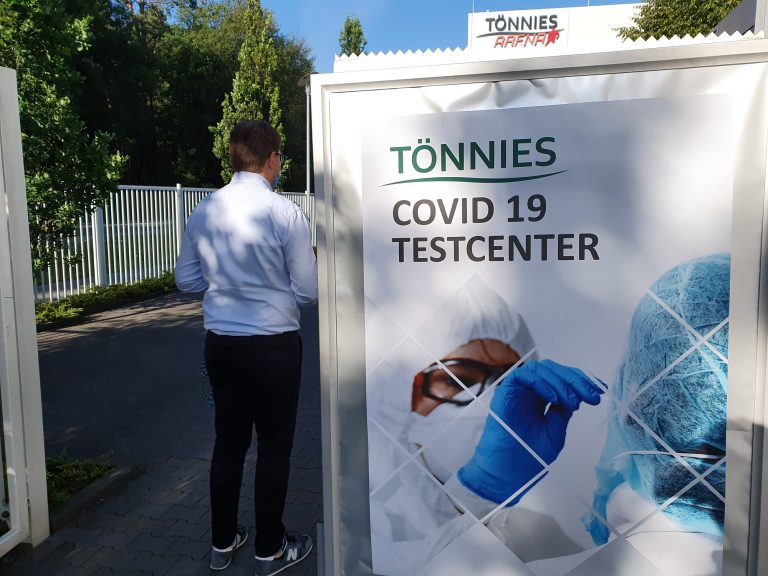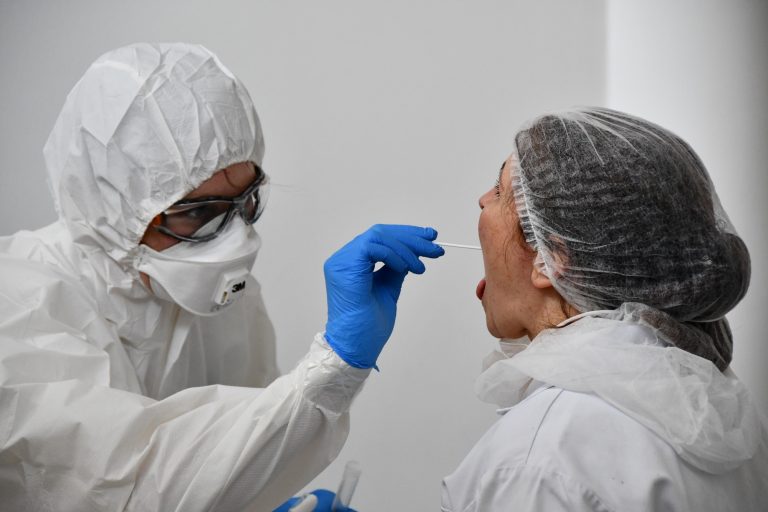Covid-19 infections among workers in German slaughterhouses is expected to not only have short term impacts on the hog market and global pork trade, but also result in fundamental changes for German pork production, according to Leif Rehder’s analysis in a July 5 Global Agricultural Information Network (GAIN) report issued by the United States Department of Agriculture.
Europe’s biggest pork slaughterhouse, a Tönnies Group facility in Gütersloh that processes over 7,000,000 hogs (between 12% and 14% of the nation’s total output) per annum, has been shutered after more than 1,600 workers tested positive for the Covid-19 respiratory disease caused by the novel coronavirus (SARS-CoV-2) that originated in China late last year and has thus far been attributed to more than 11.6 million confirmed infections and almost 540 million deaths worldwide.
German Army medical teams and special units [as seen in the photo below] were dispatched to Gütersloh last month to assist in testing residents for the potentially deadly virus. Some 600,000 people in and around the North Rhine-Westphalia town were forced back into lockdown on June 23 due to the outbreak.

“This resulted in market distortions for European hog farmers and a Chinese ban on pork imports from this company. In the long run, the infections also exposed tough labor conditions for slaughterhouse workers, so that the German government will enforce higher labor standards which may reduce competitiveness of the German livestock industry,” reported Rehder. “Covid-19 also renewed discussions about animal welfare; Germany hence included the topic on the agenda of its current EU presidency.”
The GAIN analysis noted that the immediate impact on the German market was not severe due to the general oversupply of pork and the ability to increase slaughter elsewhere. So, hog transports had to be rerouted to other slaughterhouses. There was more of an effect for farmers in Belgium and the Netherlands who typically send about 60,000 hogs for slaughter to Germany every week. Also, Irish farmers were effected by the closure since up to 50% of sows slaughtered in Ireland are sent to the Tönnies plant in Gütersloh for further processing into frankfurters, salami and other products.
China Bans Pork Imports
Tönnies was also hit hard by a decision by the Chinese government to ban its pork imports until further notice. The PRC has also halted almost all imports of pork from the Netherlands on June 28. While no specific reason was given, the action was thought to have been motivated by Covid-19 outbreaks among workers at a number of Dutch slaughterhouses.
German pork producers are among the main competitors of US pork suppliers to China. In 2019, Germany exported 0.4 million tons of pork to China valued at nearly $0.9 billion. The nation’s exports in 2020 were on track to double 2019 trade figures, with an oversupply in Germany and high demand in China due to the impact of the African Swine Fever (ASF) disease. Tönnies and the overall German pork exporter community is very dependent on the Chinese market, according to Rehder.
Coronavirus Infections on Rise
There is immense uncertainty in the German livestock and meat market as Covid-19 cases in slaughterhouses and meat processing facilities continue to mount, reported Rehder. While no other major operations have shut down thus far, authorities have announced ongoing mandatory testing of workers. Additional clusters of cases in slaughterhouses and/or processing facilities could mean closing operations for a longer time, which would heavily impact the market.

Cooling System Linked to Outbreaks
The air cooling system at Europe’s largest pork slaughter facility is said to have likely been responsible for the rapid spread of Covid-19. The center of the coronavirus outbreak tied to infections among Tönnies employees in Gütersloh was in the meat cutting section where space is tight, temperatures are low, and work is physically demanding.
Researchers at the University of Bonn claim the plant’s air cooling system did not have adequate filtration and thus is likely to have facilitated the virus’ spread. Its overall design and air cooling system is reportedly typical of most slaughterhouses in Germany. UV radiation and high-quality filters could reduce the risk for coronavirus transmissions.
Labor Conditions Also a Factor
The first Covid-19 infections among slaughterhouse workers in mid-May 2020 publicly exposed tough labor conditions, reported Rehder. The German government has decided to more strictly enforce existing labor standards and implement new, higher labor standards by January 2021.
With market leader Tönnies now in the spotlight and further mass testing underway, labor conditions in slaughterhouses are back on the political agenda. The animal slaughter industry is already committed to improving labor conditions before the end of the year. This means higher costs and limited competitiveness of the German livestock industry in the long term.
Animal Welfare Issue in Spotlight
Animal welfare has long been high on the agenda of German agricultural ministers and there have been several initiatives to make improvements, without much effect. The problem is, that the implementation of national standards prior to the development of a higher EU standard puts German farmers at a cost disadvantage, compared to their Spanish or Polish counterparts, for instance. And, the industry’s ability to mitigate costs while still meeting new standards poses a challenge. Still, Germany has long been a vocal leader on this issue at the European level. However, there has never been a majority in favor of stricter animal welfare standards.
“Now that Covid-19 has put the slaughter industry in the spotlight and Germany holds the EU presidency from July 1 to December 31, Germany again wants to move forward on this issue and introduce a single, consumer-facing animal welfare logo, along the lines of that already in place for organic food,” said Rehder. “For the German government, such an animal welfare label would enable EU consumers to make better informed purchasing decisions. While the success of this initiative is uncertain at the EU level, it is quite likely that Germany will implement stricter animal welfare regulations at home. Currently, there is just too much pressure on the German livestock industry and especially the pork market.”





